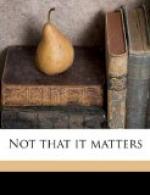Our thermometer went down to 11 deg. the other night. The excitement was intense. It was, of course, the first person down to breakfast who rushed into the garden and made the discovery, and as each of us appeared he was greeted with the news.
“I say, do you know there were twenty-one degrees of frost last night?”
“Really? By Jove!”
We were all very happy and talkative at breakfast—an event rare enough to be chronicled. It was not that we particularly wanted a frost, but that we felt that, if it was going to freeze, it might as well do it properly—so as to show other nations that England was still to be reckoned with. And there was also the feeling that if the thermometer could get down to 11 deg. it might some day get down to zero; and then perhaps the Thames would be frozen over again at Westminster, and the papers would be full of strange news, and—generally speaking—life would be a little different from the ordinary. In a word, there would be a chance of something “happening”— which, I take it, is why one buys a thermometer and watches it so carefully.
Of course, every nice thermometer has a device for registering the maximum and minimum temperatures, which can only be set with a magnet. This gives you an opportunity of using a magnet in ordinary life, an opportunity which occurs all too seldom. Indeed, I can think of no other occasion on which it plays any important part in one’s affairs. It would be interesting to know if the sale of magnets exceeds the sale of thermometers, and if so, why?—and it would also be interesting to know why magnets are always painted red, as if they were dangerous, or belonged to the Government, or—but this is a question into which it is impossible to go now. My present theme is thermometers.
Our thermometer (which went down to 11 deg. the other night) is not one of your common mercury ones; it is filled with a pink fluid which I am told is alcohol, though I have never tried. It hangs in the kitchen garden. This gives you an excuse in summer for going into the kitchen garden and leaning against the fruit trees. “Let’s go and look at the thermometer” you say to your guest from London, and just for the moment he thinks that the amusements of the country are not very dramatic. But after a day or two he learns that what you really mean is, “Let’s go and see if any fruit has blown down in the night.” And he takes care to lean against the right tree. An elaborate subterfuge, but necessary if your gardener is at all strict.
But whether your thermometer hangs in the kitchen garden or at the back of the shrubbery, you must recognize one thing about it, namely, that it is an open-air plant. There are people who keep thermometers shut up indoors, which is both cruel and unnecessary. When you complain that the library is a little chilly—as surely you are entitled to—they look at the thermometer nailed to the Henry Fielding shelf




